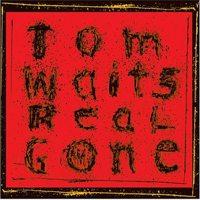For someone like Tom Waits, making another album seems almost pointless. For thirty years he has proven himself to be miles ahead of nearly everyone around him. Starting as a balladeer in a martini haze, and morphing into a strange, oddly poetic noise master, one could make the case that Waits has done all there is for him to do, and is only repeating himself.
It turns out that anyone who thought that Tom Waits couldn't surprise his listeners ended up being completely wrong. Real Gone is a fourteen-song juggernaut that shakes you down to your very core and hits you everywhere you least anticipate. The most conspicuous aspect of this album is the absence of one instrument: the piano. It has been one of Waits' trademarks, but for some reason, he decided that it wasn't necessary for any of these songs. This means that tender ballads from past albums such as "Georgia Lee" or "Time" are not here to lighten up the mood at all. Instead, Waits builds a good portion of these songs around what he calls "mouth rhythms." They're essentially mini-cassette recordings of him in a bathroom, beatboxing a rhythm, and then having all of the instrumentation layered over it. It's a technique that you're greeted with right as the album starts, with "Top Of The Hill," a song that at first seems like something off an indie hip-hop album. "Metropolitan Glide" is another noise-fest, this time offering an instructional dance. Somehow, this song was just nominated for a Grammy. We'll see if Waits can hold is own at the ceremonies against more traditional (and boring) songwriters in his category like John Mayer.
The album's centerpiece is the eleven-minute marathon "Sins Of The Father." It employs one of Waits' best techniques: building terror and suspense around a quiet, eerie groove that can best be described as "murder blues." As the song reaches its end, you've been brought to the edge of the cliff and are left there, dangling, wanting more.
Another one of Tom Waits' most distinguishable aspects of his albums is his lyrics. There are many of the usual lyrics that we would expect from Waits on Real Gone, with beat-poet metaphors and desperate characters. But a couple of the songs take on political tones, albeit with Waits' evasive narrations. "Day After Tomorrow" is from the point of view of a soldier, sent off to fight in a war that he simply doesn't understand. A line such as "I still don't know how I'm supposed to feel about all the blood that's been spilled. Will God on his throne get me back home on the day after tomorrow?" feels like a wave of wisdom washing over you, coming from the wise old mind of Tom Waits.
It would take much more to describe the entire album, since each song is in its own distant dimension. What can be easily said is that Tom Waits, even after making music for thirty years, is still challenging himself and his audience beyond their wildest expectations. For one of the few truly rewarding releases of 2004, you need look no further than Real Gone.
